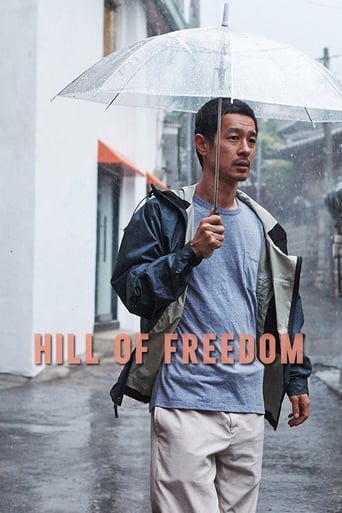

Truly Dreadful Film
... View MoreThe joyful confection is coated in a sparkly gloss, bright enough to gleam from the darkest, most cynical corners.
... View MoreI think this is a new genre that they're all sort of working their way through it and haven't got all the kinks worked out yet but it's a genre that works for me.
... View MoreStrong acting helps the film overcome an uncertain premise and create characters that hold our attention absolutely.
... View MoreHong Sang-soo is the name of a director that I know. Having seen his 'Hahaha' a few years back, and remembering how it made me 'ha ha ha', I was looking forward to what appeared to be another comedy involving reminiscing and discussions over alcohol. Where 'Hahaha' used still photos while the conversation continued to flow, 'Hill of Freedom' uses another inventive technique for this not-always-so- subtle comedy. Mori, played effectively by Japanese man Ryo Kase (you remember him), is a Japanese man returning to Korea for two weeks looking for the Korean student he fell in love with when working in Seoul as a language tutor. The Korean student, Kwon, unaware of his return, has also recently returned to Seoul after some time away recovering from illness under the care of a man combining being both a preacher and doctor. She finds she has been left a series of letters written by Mori in broken English. Dropping the letters, she loses the chronological order that Mori had clearly put them in, yet failed to date. Kwon then begins to read the letters, which are acted out for us, but with the order now lost so the film now becomes a sprawling collection of mish-mash snips of Mori's time in Korea. This means things are seen before they actually happen (sort of) creating confusion for the audience (sort of). The chronology is not particularly distracting and adds a nice charm to the film, as well as some comedy moments. The real comedy here, however, is the fact that this is a Korean film, centred around a Japanese man, that is acted largely in English. Mori's lack of Korean means he bumbles his way about a corner of Seoul where everybody just so happens to be relatively fluent in the Queen's. This presents lots of broken conversations and odd phrases uttered between the two clashing cultures, with 'you're a strange man' being met with 'you're a strange man.' Confusion is sometimes created and from thence the humour arose. Mori's motivations are not always clear, in what is a short film, coming to Korea while unemployed with no real plan upon arrival except see Kwon, getting drunk with his guesthouse owner's nephew and flirting - and more - with a local cafe worker. Though his lack of direction is often questioned by the Koreans he comes into contact with, often mistaking him for an artist due to his scruffy appearance and daily sleeping habits. He is a man searching for something, whatever it may be.But Hong keeps things light, showing that Mori is clearly troubled, but not diving too far in. Being a short film, just over an hour, this is probably a good thing, kept as a comedy, not a moody love story. The postscript ending is a clear sign of this, concluding a postmodern film about post.
... View More